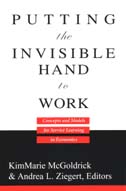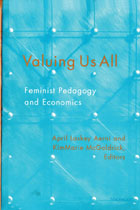2 books about McGoldrick, KimMarie

Putting the Invisible Hand to Work
Concepts and Models for Service Learning in Economics
KimMarie McGoldrick and Andrea L. Ziegert, Editors
University of Michigan Press, 2002
Service learning is an experiential learning pedagogy that enables students to integrate their study of economics in the classroom with service activities in their communities. It can enhance both economic literacy and the quality of our communities by helping to make economics more accessible to an increasingly diverse student body, increasing student citizenship skills, and improving the relationship between colleges and universities and their communities.
The two parts of this volume provide a theoretical basis for service learning and offer lessons gleaned from applying it in the classroom. The theoretical chapters outline the learning theory and models of service learning as they can be applied in economics. Service learning is introduced here as a technique that teaches students to "do economics." Also included are specific models of service learning and an overview of assessment issues. The applications chapters detail various examples of using service to enhance learning. These range from using a single service experience in a class to courses that use service experiences as the focus and context for learning economics. Course topics cover environmental and natural resources, statistics, econometrics and research methods, principles and economic issues, labor, the economics of gender, forensic economics, and development economics. Each application provides details regarding the institutional environment in which it was implemented, type of course, enrollment, and process through which student learning was enhanced. Handouts and abbreviated syllabi are included.
Economics educators have a stake in improving their students' long-term economic literacy. Service learning offers significant benefits beyond those offered by pedagogies traditionally found in economics classrooms and should be considered as a teaching strategy by economics professors everywhere.
Kim Marie McGoldrick is Associate Professor of Economics, University of Richmond. Andrea L. Ziegert is Associate Professor of Economics, Denison University.
The two parts of this volume provide a theoretical basis for service learning and offer lessons gleaned from applying it in the classroom. The theoretical chapters outline the learning theory and models of service learning as they can be applied in economics. Service learning is introduced here as a technique that teaches students to "do economics." Also included are specific models of service learning and an overview of assessment issues. The applications chapters detail various examples of using service to enhance learning. These range from using a single service experience in a class to courses that use service experiences as the focus and context for learning economics. Course topics cover environmental and natural resources, statistics, econometrics and research methods, principles and economic issues, labor, the economics of gender, forensic economics, and development economics. Each application provides details regarding the institutional environment in which it was implemented, type of course, enrollment, and process through which student learning was enhanced. Handouts and abbreviated syllabi are included.
Economics educators have a stake in improving their students' long-term economic literacy. Service learning offers significant benefits beyond those offered by pedagogies traditionally found in economics classrooms and should be considered as a teaching strategy by economics professors everywhere.
Kim Marie McGoldrick is Associate Professor of Economics, University of Richmond. Andrea L. Ziegert is Associate Professor of Economics, Denison University.
[more]

Valuing Us All
Feminist Pedagogy and Economics
April Laskey Aerni and KimMarie McGoldrick, Editors
University of Michigan Press, 1999
A basic knowledge of economics is critical for making informed decisions in today's world. By offering courses and materials that are more relevant to our students' lives and encouraging more active participation in the discovery of economic concepts and theories, we promote the development of informed citizens.
This volume collects pioneering work on the integration of feminist pedagogy in economics. Part 1 introduces a vision of feminist pedagogy, explains the importance of developing feminist pedagogy in economics, and proposes a model for achieving feminist pedagogy in economics that suggests changes in both course content and teaching methods. Part 2 reveals how current course content is narrowly defined and demonstrates how content can be altered to be more inclusive. Included are an analysis of current textbook treatments and examples of broadening discussions of labor supply models, U.S. poverty, and stereotyping, as well as general overviews of macro- and microeconomic courses. Part 3 reports on current disparities in economics education by gender and provides alternative teaching strategies for correcting this problem, including the service learning, peer review, e-mail discussion lists, case studies, internships, and collaborative learning.
The contributors incorporate their vision of a new pedagogy with important economic concepts emphasizing equity as well as efficiency, cooperation as well as competition, and inter-dependence as well as independence. The volume will be a valuable resource for college faculty teaching economics in the United States, as well as to those teaching in related disciplines who want to design exercises that promote a more inclusive classroom environment through changes in both content and teaching methods.
April Laskey Aerni is Associate Professor of Economics, Nazareth College of Rochester. KimMarie McGoldrick is Associate Professor of Economics, University of Richmond.
This volume collects pioneering work on the integration of feminist pedagogy in economics. Part 1 introduces a vision of feminist pedagogy, explains the importance of developing feminist pedagogy in economics, and proposes a model for achieving feminist pedagogy in economics that suggests changes in both course content and teaching methods. Part 2 reveals how current course content is narrowly defined and demonstrates how content can be altered to be more inclusive. Included are an analysis of current textbook treatments and examples of broadening discussions of labor supply models, U.S. poverty, and stereotyping, as well as general overviews of macro- and microeconomic courses. Part 3 reports on current disparities in economics education by gender and provides alternative teaching strategies for correcting this problem, including the service learning, peer review, e-mail discussion lists, case studies, internships, and collaborative learning.
The contributors incorporate their vision of a new pedagogy with important economic concepts emphasizing equity as well as efficiency, cooperation as well as competition, and inter-dependence as well as independence. The volume will be a valuable resource for college faculty teaching economics in the United States, as well as to those teaching in related disciplines who want to design exercises that promote a more inclusive classroom environment through changes in both content and teaching methods.
April Laskey Aerni is Associate Professor of Economics, Nazareth College of Rochester. KimMarie McGoldrick is Associate Professor of Economics, University of Richmond.
[more]
READERS
Browse our collection.
PUBLISHERS
See BiblioVault's publisher services.
STUDENT SERVICES
Files for college accessibility offices.
UChicago Accessibility Resources
home | accessibility | search | about | contact us
BiblioVault ® 2001 - 2024
The University of Chicago Press









